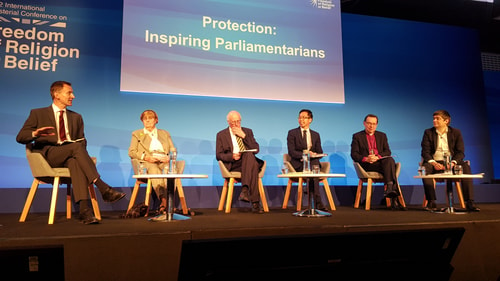At the International Ministerial Conference on Freedom of Religion or Belief, governments committed to work towards preventing abuse and to promote and protect religious freedom.
The event brought together representatives from more than a hundred countries, with many government ministers and diplomats present. Alongside the main conference sessions focused on prevention, promotion and protection, events took place on the side-lines, many profiling places where Christians suffer severe persecution for what they believe and for practising their faith.
In Parliament this week Fiona Bruce MP, the Prime Minister’s Special Envoy for Freedom of Religion warned the Prime Minister that: “This significant conference will count for nothing unless it results in concerted global action to deliver freedom of religion and belief around the world.”
In the closing session of the conference Mrs Bruce said that there is a need to strengthen legal systems to ensure beliefs are protected, work more closely across the globe and improve education and awareness. She said: “We want to ensure that there is more boldness about raising individual cases of discrimination with foreign governments.”
On the same day as the start of the conference, the National Parliamentary Prayer Breakfast took place in the Houses of Parliament, with nearly 200 MPs joining church leaders to pray and reflect on pursuing the common good. The keynote address from Les Isaac, Chief Executive of the Ascension Trust and founder of Street Pastors, was cited by Sajid Javid MP in his statement following his resignation from the government, in which he talked about “the responsibility to serve the interests of others above your own and to seek common ground, of your party, your community and above all your country.”
Meanwhile the conference heard messages from the Prince of Wales and Prime Minister, Boris Johnson. Alongside a range of faith leaders calling for freedom for all, the Foreign Secretary Liz Truss said: “The freedom to believe, to pray and commit acts of worship, or indeed not to believe is a fundamental human freedom and has been one since the dawn of time. Societies that allow their people to choose what they believe are better, stronger and ultimately more successful.”
The Archbishop of Canterbury told the conference: “We know that, when freedoms of expression and worship are restricted, other freedoms and opportunities are limited too. Women, minorities, many other people miss out.”
The UK FoRB Forum, of which the Evangelical Alliance is a member, draws together civil society groups to share information and key issues of concern regarding freedom of religion or belief. Countries across the globe were encouraged to establish similar groups to ensure that faith leaders and civil society are fully involved in protecting and promoting religious freedom.
The Chief Rabbi, Ephraim Mirvis, also addressed the conference and called for a substantive freedoms to live out beliefs: “Freedom to shape, to enhance, and inspire their societies. Freedom to educate their children in the spirit of the tenet of their faith so that through their faith they will be outstanding and responsible citizens.” He went on to say: “May we in our societies, in our countries, guarantee that we will turn away from unacceptable conduct relating to religion and belief so that adherents of faith will be free to contribute to the future wellbeing of our fragile world.”



